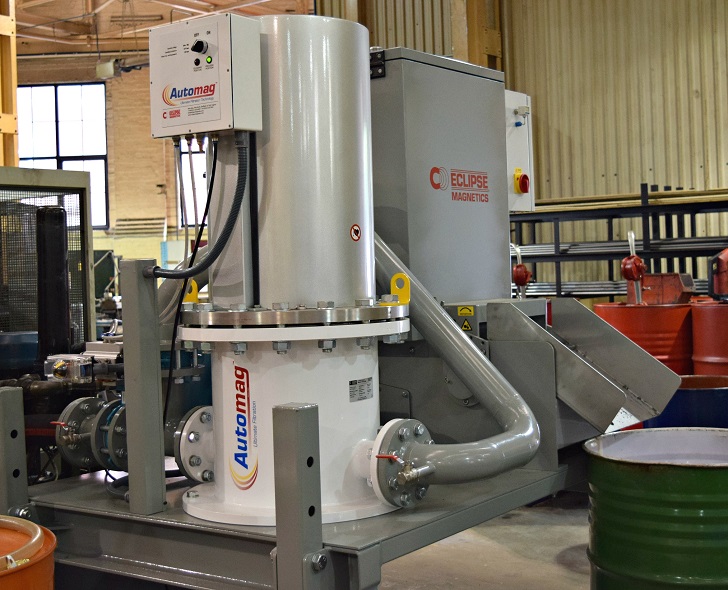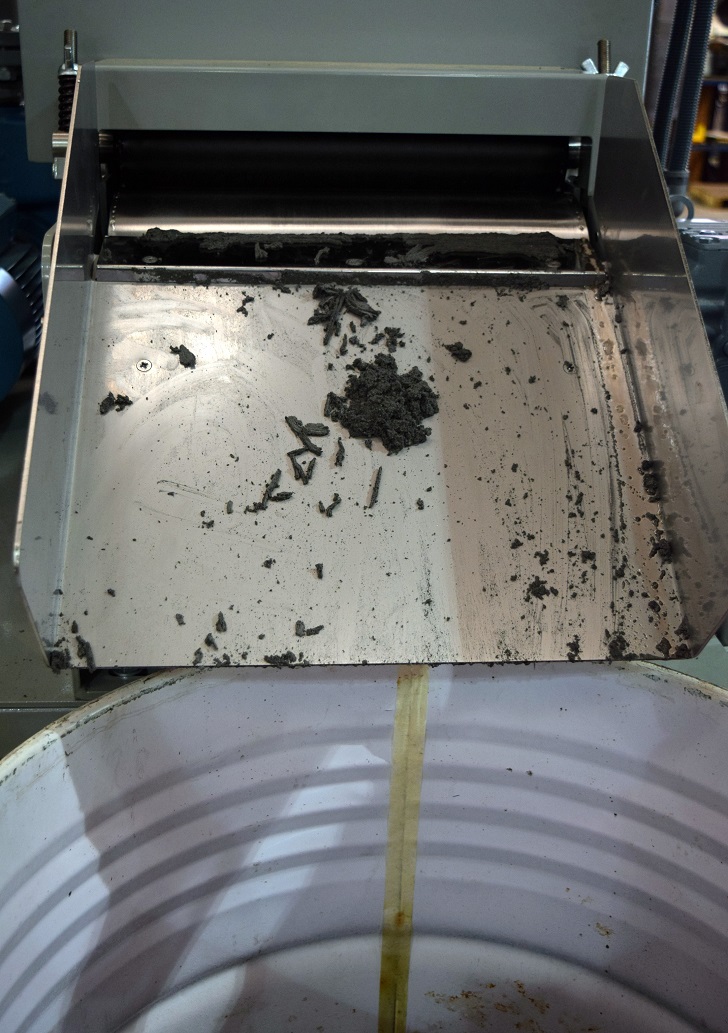

When a UK supplier of specialist tools for industrial engineers had problems with oil contamination in its grinding machines, it looked at alternative filtration methods. The solution was a self-contained filtration and fluid recovery system which suited the company’s tool grinding machines.
Based in Sheffield, South Yorkshire in the UK, OSL Cutting Technologies is a supplier of specialist cutting tools for industrial use. Products include magnetic drilling and hole cutting systems for a diverse range of applications including sheet metal and fabrication, general engineering, construction and utilities, electrical, automotive and transportation accessory fitting, and general trades and DIY.
OSL Cutting Technologies uses three Walter tool grinding machines to aid them in the manufacture of components used to make its products.
Eclipse Magnetics has long experience in the design and manufacture of magnetic filtration systems and its AutoMag Skid magnetic filtration system was the solution that worked well with the tool grinding machines used at OSL Cutting Technologies.
Oil contamination OSL Cutting Technologies had previously used several different filtration methods on its Walter grinding machines, including two MicroMag magnetic filters from Eclipse Magnetics. However, due to the high volumes of oil passing through these smaller filtration units, they quickly became overwhelmed with contamination and the build-up of sediment.
With contaminated oil still passing through the grinding machines, the quality of the grinding process was compromised. Machine operators had to clean out the filters manually, resulting in machine downtime and labour costs.
The collection of contamination in the grinding machines also affected the bellow machine covers in use on the Walter, resulting in their frequent replacement at a cost of approximately £3,000 per year. The swarf material that was removed from the machine was saturated with oil, and OSL Cutting Technologies had to pay for the removal and disposal of this material.
AutoMag Skid Eclipse Magnetics provided OSL Cutting Technologies with an AutoMag Skid magnetic filtration system. The AutoMag Skid is an effective self-contained filtration and fluid recovery system with fully automated operation, minimising fluid loss during cleaning and ideal for the company’s tool grinding machines.
The AutoMag Skid removes magnetic and para-magnetic contamination, down to submicron size, from the oil used in OSL Cutting Technologies’ Walter grinding machine. The filter holds the contamination until it is released during the automated 'purge' process, which briefly diverts the filter's purged output so that fluid carries all the contamination to the buffer tank.
The buffer tank then feeds the contaminated fluid to the high-intensity coolant roller and the magnetic coolant roller removes the contamination from the fluid. The clean fluid is then put back into circulation, and the contamination is extracted in a form ready for disposal or recycling.
Effective removal Since the installation of the AutoMag Skid magnetic filter from Eclipse Magnetics, approximately 90% of swarf material has been successfully removed from the oil. Cleaner oil means that it can be used for longer periods of time, therefore reducing costs.
The effective removal of swarf from the oil results in extended lifespan of machine components, including bellows, saving OSL Cutting Technologies £3,000 per year. Cost savings are also made regarding manpower, as operators no longer need to clean out the filters manually.
The filter has also reduced the disposal costs of the particulate removed from the oil. Previously, OSL Cutting Technologies had to pay for the disposal of a thick, oily paste which carried the metal particulate. The metal particulate removed by the AutoMag skid is much drier with substantially reduced oil content, which can be sold as scrap.
David Hukin, works engineer at OSL Cutting Technologies, said: “The AutoMag skid has exceeded our expectations; we are more than happy with its performance. Now, 90% of swarf material is being successfully removed from the oil, which is a massive improvement and results in plenty of cost savings for us.”
Advanced magnetic filtration This method of magnetic filtration has been specifically developed to overcome some of the typical problems experienced when using traditional filters. It can be easily fitted to significantly enhance existing filtration systems but is also ideal for new build projects as a standalone solution.
Fully automated magnetic filtration systems are an effective solution for continuous manufacturing lines, offering 24/7 uninterrupted filtration and resulting in minimal downtime.
Advanced magnetic filtration ensures the effective removal of ferrous particles, including sub-micron particles from the process and has a number of benefits. Not only is the lifespan of fluid significantly extended meaning that savings can be made on the cost of oil or coolants, but substantial savings can also be made on any existing consumable filters.
This minimises filter waste and reduces the environmental impact incurred as a result. Not only is magnetic filtration an attractive cost option, it’s also great for saving space on the shop floor, and with no consumables, it is much better for the environment. It also improves product quality and surface finish.
Nigel Hampson, sales manager for Filtration at Eclipse Magnetics, said: “In my opinion, advanced magnetic filtration systems are actually the most effective method of removing problem ferrous particles from industrial fluids.
Eclipse Magnetics filters have the capability to remove almost 100% of ferrous particles from coolants and oils, including sub-micron size. Magnetic filtration systems effectively remove particles that could act as an abrasive and therefore avoid the common problems of wear and damage to process equipment, and reduction in part quality and surface finish.
Magnetic filters remove these damaging particles almost completely, making them a fantastic option for achieving the highest levels of surface quality and finish in processes including grinding, lapping, honing, milling and drilling.”




